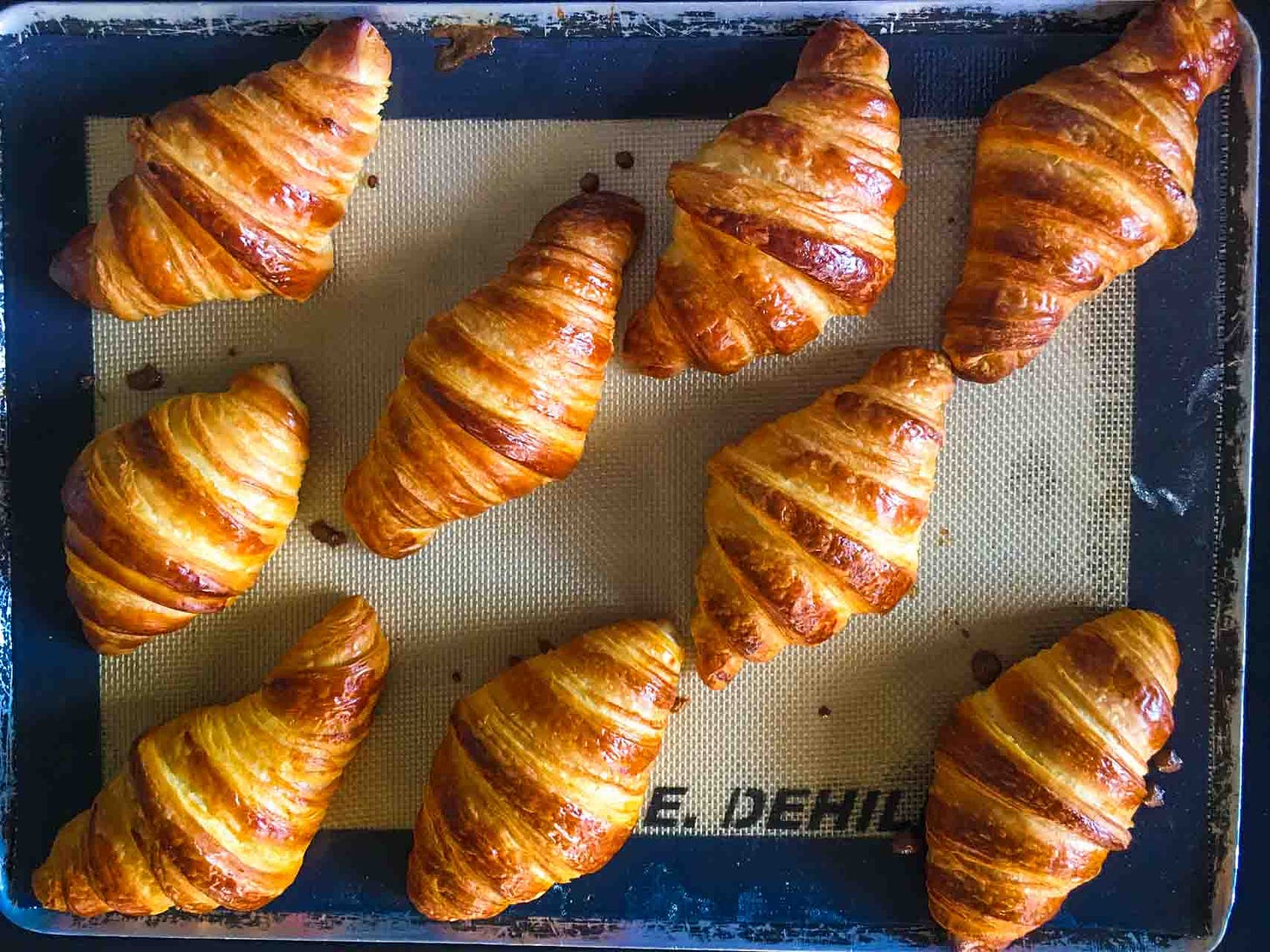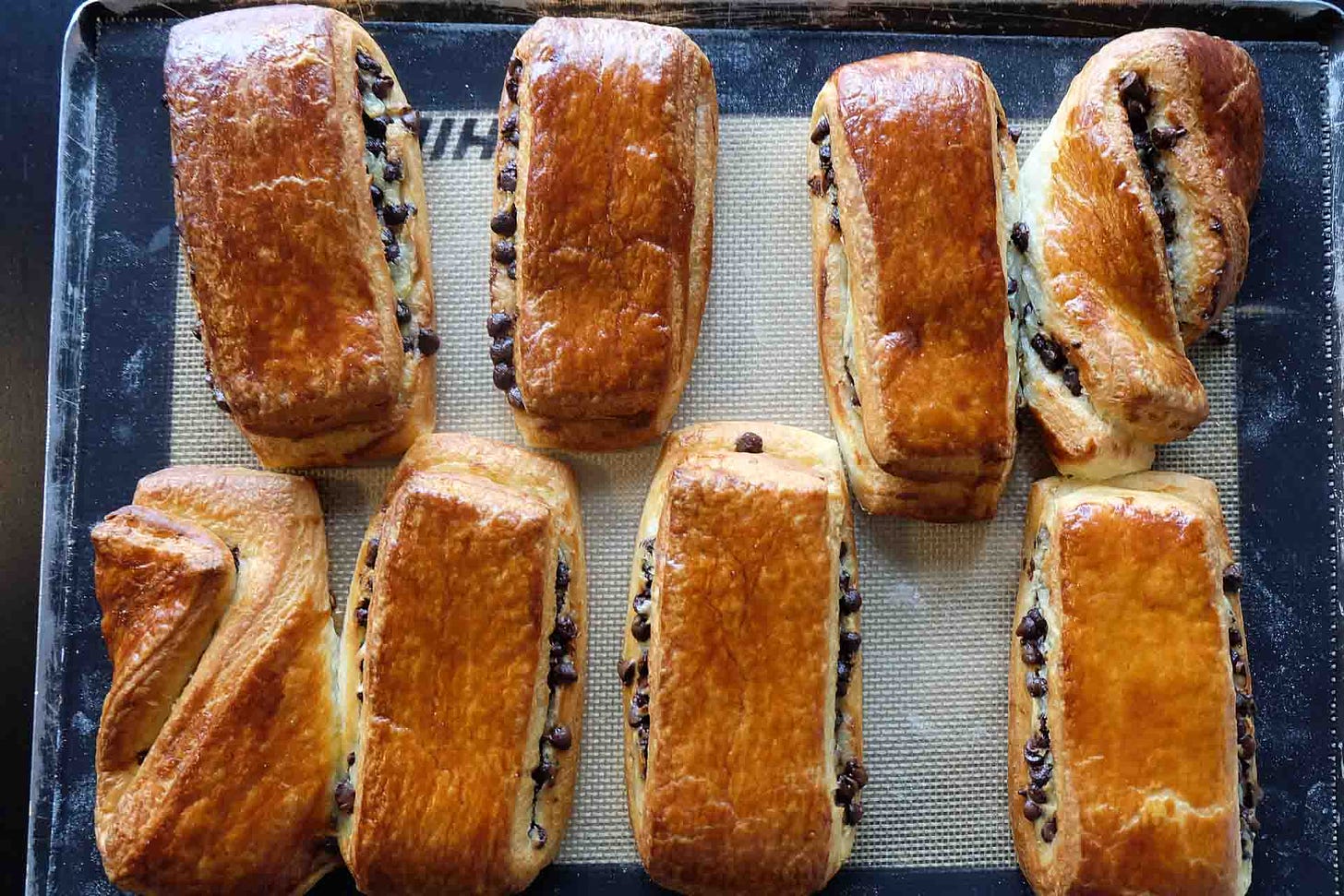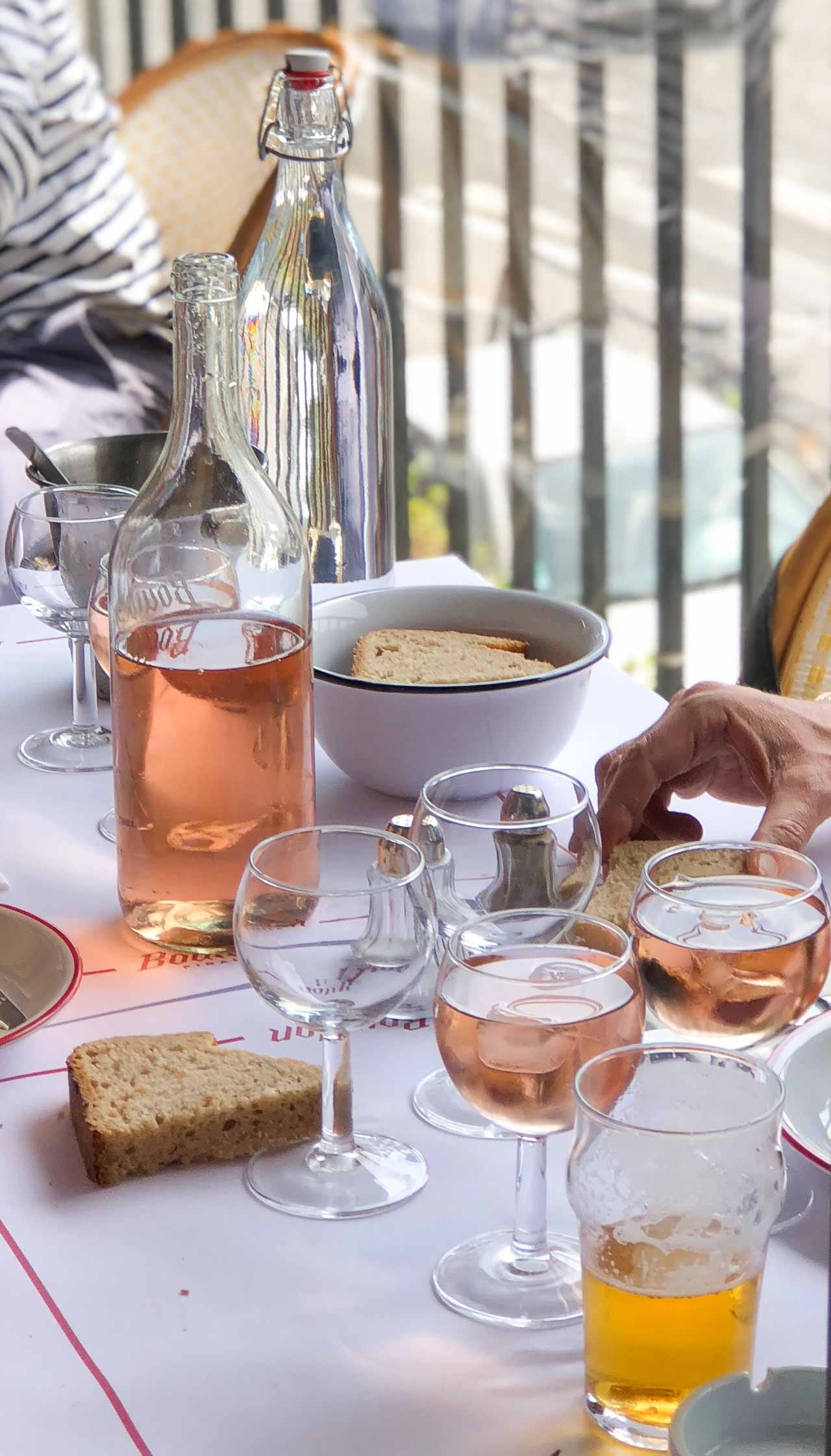Q+A with Jane Bertch from La Cuisine
The trials and tribulations of running a French cooking school in Paris
Jane Bertch is the co-owner of La Cuisine cooking school, where people come from all over the world to learn how to make croissants, baguettes, macarons, and tarts as beautiful as the ones you see in pastry shop windows. Over the last year, the courses have shifted online but as a small business owner in a city that’s been hit by a number of setbacks over the last few years, from the longest strike in French history to a global pandemic, I wanted to have a chat with Jane about what made her come to Paris, and stay, the pleasures and pitfalls of being a small business owner in France, and how her cooking school is coping with the pandemic…
Hi Jane. Happy to have you here in my newsletter! You previously lived in Chicago and arrived in 2005. When you landed in Paris, what was your plan?
JB: Yes indeed, I am a proud Chicagoan no matter how long I have been gone, and it has been quite a while. I don’t want to age myself, but I’ve half my life in Europe! I arrived in Paris on a professional transfer from London where I lived beginning in 1999, working for an American bank. I jumped at the opportunity to leave London to explore new horizons here in Paris. I arrived in December of 2005 and haven't looked back. I spent my first years in Paris working in corporate banking in the 8th arrondissement. My clients were in the automobiles and industrials sector; Michelin, Renault, Peugeot, Lafarge (one of the largest cement companies), etc.! A very non-Emily in Paris story, but a very rewarding one.
However, you probably want to know about the in-between story, and as always, yes, there is one. I will say that changes like these are not glamorous nor are they easy. It’s a lot of hard work. When you leave your current situation for new endeavors, you may find the greatest resistance is from those who love you and worry that you’ve lost your mind. But that’s ok - if you lose your mind, you can let your heart take the lead. The most important thing is to keep your focus and keep your eyes open. You may one day see a little snowflake floating down in front of you. The trick is not just being open to seeing it, but of course, daring to catch it!
DL: So you started La Cuisine in 2009. There are a number of cooking schools in Paris that teach half-day and similar classes. Some of them only last a few years: A neighbor of mine told me he was going to lead culinary tours for Americans, but he didn’t speak English. I gently mentioned to him that that might be an issue… But there are a number of cooking schools in Paris that cater to locals and visitors. How were you able to succeed with so much competition?
JB: In a city that welcomes (under normal circumstances...) 14 million visitors a year, I like to consider other cooking schools in the market as colleagues, rather than competition. I hope there is enough to go around! Frankly, others have always kept me on my toes. (I hope I’ve done the same for them). We may do similar things, but indeed each small business has a personality of its own. That makes for a nice diversity of cooking styles at the various cooking schools in Paris.
There are so many elements that go into the success of a small business. Some are out of our control, but I will try to comment on a few that are. From our beginning, so many years ago, I took to heart a piece of feedback from a respected colleague. He told me: A business that doesn’t succeed is the one that doesn’t do what the clients ask of it.” It’s our clients that always have such great ideas, so I focus on listening to them.
From day one, first and foremost, I thought it best to listen to the experts - our clients. Our clients have the best ideas, and I work to bring those to life. Whatever fancy title you want to put on it (‘Design Thinking’ comes to mind), everything we create here at La Cuisine Paris is with our clients in mind. Secondly, we have always wanted a sense of community. This community includes those that visited us 11 years ago, to those who are yet to come. I think people have appreciated this, and as any small business knows, the community is everything. We happen to be lucky enough to have the most incredible folks in ours.
Lastly, but equally important, it’s a team effort to be successful - and we have a phenomenal team working with us. Very much like a conductor at a symphony, my job is to let the experts (ideas from clients and our team, who runs the classes) get on with it; I just make sure we all come together to create the right music.
So, a LONG answer to say that over the years we have succeeded with a combination of all the above. And always, with a bit of luck. But as they say, “Luck is what happens when preparation meets opportunity’ which was supposedly the words of Seneca, a Roman Stoic Philosopher.
DL: It’s been a tough few years for small businesses and tourism in Paris, which have included demonstrations by the gilet jaunes (which forced many businesses to close), the longest strike in French history, and now Covid-19. How are you, and La Cuisine, holding up?
JB: Thank you for asking David. It’s been a tough 18 months, that’s for sure. Finally overcoming the hurdles of late 2019 (and there are a few others that have added up over the past years!), to then fall into a pandemic, is definitely trying. For a rare moment in history, I think we can all say we have something in common; shared emotions of fear, insecurity, loneliness, and uncertainty.
When you run a business, these emotions are still there, but they percolate on a totally different level. You know that your decisions not only impact you but many others. Most importantly, we have a team of people that relies on our business for their livelihood. That’s a lot to carry.
Some days I have to remind myself that I know this playbook. I’ve dealt with these same fears before. It’s slightly different, but at its core, this experience of fear, insecurity, loneliness, and uncertainty is the everyday life of any new business just getting started. You are often wondering if you will make it. We’ve been there and we did make it. 11 years later I am determined to make it again. We are also not alone, which is a blessing. The sheer generosity and support we have received (from you, David, and so many others) have been incredible. Every day I remind myself that we have a purpose and a goal, and we have a community that helps to get us there.
There is always a silver lining to these periods, even if we have to work awfully hard to see it. We’ve really needed to dig deep into our reservoirs of creativity, and I believe we have strengthened our community, and we have created several local partnerships (from wine to culinary equipment). All of this is an effort to keep our client community connected with us and to France. The residual benefit is that it keeps us busy and of course helps support other small businesses in our community.
DL: Aside from a drop in business, what’s been the part of 2020/2021 that has been the most difficult for you?
JB: Those are tough questions, David! If there is one thing, it’s a lack of visibility. Pain is easier to tolerate when you have an idea of how long it will last. Right now, none of us have the benefit of knowing how long this current situation will last, and we just have to sit with the silence of that. That is very, very hard for someone like me who spends days and weeks ‘planning.’ But without visibility, a plan is nothing more than a daydream.
The second runner-up has been accepting vulnerability. I thank Brené Brown (a true role model and an amazing research professor studying courage, vulnerability, shame, and empathy) for that. When people have looked to me for answers, I had to get comfortable saying “I don't know”.
So, like all of us, there are days when I feel like we are hiking out of a deep never-ending canon - and I feel exhausted by it. Then to the rescue, I’ll refocus my energy and thoughts, and we’ll get a lovely email from a client, or a photo memory will pop up somewhere, or a sweet message on Facebook, and I’m recharged with energy to keep going.
DL: I’ve had a lot of people wondering when France is going to open back up or when travel will be possible. I just have to say “I don’t know,” because...who does? While we wait, you’ve pivoted to online cooking and baking classes. What are those like?
JB: We have. Admittedly, I started doing them with MUCH trepidation. What we do is so much about connecting with those that are physically here in Paris cooking and baking with us. There is nothing more magical than having visitors from various parts of the world converge in our little Paris kitchen to share food. I was worried that a virtual experience wouldn't deliver that same connection. Yet, I listened to our clients who continued to ask for online cooking classes, so ultimately we created them.
Pivoting to online, we consciously took two approaches to make sure we were meeting the needs of as many folks as possible: A pre-recorded set of six video classes on topics that I felt required more time and patience (croissants, macarons, etc.), and live Zoom classes focusing on basic French Dishes (éclairs, tartes, croque monsieur) things that are easier managed at a distance.
I’m enjoying both experiences, and most importantly grateful for the community of clients and teachers that are a part of them. And clearly, this is the main source of activity for our team, so they are incredibly important to us. I will say that I hope these will be temporary solutions, not our entire business model! It is nice to have a tool that will keep us connected with everyone at a distance, which opens up a world of possibilities. Nevertheless, we’d rather have folks here with us…but we will take what we can get!
DL: Your classes are usually held in English. During normal times, do you get French people coming to La Cuisine, too?
JB: For the most part, cooking classes for local French clientele need to be sexy, trendy (or tendance as the French say), and exotic. Calling La Cuisine Paris sexy and exotic feels as wrong as if you described a grandmother that way. No matter how much I’d like to think so, béarnaise sauce and croissants just don’t fit that bill. We do classic French cuisine and it is considered a little ‘old fashioned’ sometimes. But it’s what their grandmothers made.* And that’s ok with us.
However, we do have local French clients from time to time. In the winter they tend to come in the form of company team building and every so often they take our pastry classes - usually macarons (just for curiosity's sake).
I might add that the average Parisian kitchen doesn't support extensive cooking, and France is the land where we leave certain things to the experts. (And rightfully so!) Most French people do just that. If a French person wants to have an elegant dessert for a dinner party, they’re likely to buy it from a pâtisserie, rather than make it!
*If I could forecast a trend, I would see the desire for exotic classes changing. Hopefully the past year has taught us not only the importance of knowing how to make the basics, but the comfort and satisfaction one gets in mastering them!
DL: How are French guests & students different from visitors from elsewhere?
JB: When you work in the service industry, you learn quite quickly that you must be culturally aware and sensitive. Each culture has (in general) not only a different language but a different ‘code’. If you want to welcome clients of all nationalities, you have to train your ear to hear what they don’t say.
Our French clients are a different type of client - bien sûr. Most importantly, there tends to be more of a formal distance between people that do not know each other in France. For our classes, this does translate into a less personal approach than we like to deliver in our day-to-day classes, but we respect that. Our French clientele also tends to be more focused on a technique than an ‘experience.’ Our visiting clients like both - and we love that.
DL: What is your most popular class or program?
JB: That is a fun question because it changes depending on which country the client is visiting from. It’s also very much influenced by local trends! I will say that the long-running sustainer is the Croissant Class - it’s globally popular. We cannot do enough of them. The Market Classes are popular as well, which are seasonally influenced.
(As a side note, a fun and unexpected thing about being exposed to the tourism industry is you really get an insight into global economics! You can see quickly what countries are growing, how their currencies are performing, etc.)
DL: What are some of the challenges you’ve faced having a cooking school in Paris?
David, my list is long! Paris is a unique point in the planetary system where I sometimes think we, as expat locals, live in a parallel universe. All that is beautiful and ethereal, if you are visiting, resides alongside all that is heavy and unusual, if you are living here and running a business. But that’s why we love Paris - she is complex!
I'd love to have this chat over wine with all your readers, but here are a couple of nuggets:
One of my biggest challenges is one of my rewards. I realized early on that we are not actually in the business of cooking classes. There, I said it!
In my opinion, we are more in the business of sharing culture and creating memories - and we have the privilege to do that through cuisine. For many people who walk through our door, this is a once-in-a-lifetime trip charged with expectations and emotions - not only about their activities but importantly, about their experience with France and French culture. These perceptions and expectations are challenging for us to deliver on because they are so personal. Yet, we work very hard to make sure that we share French culture in a way that is memorable to those who visit us. Long after someone has left, they may not remember what they made, but they will remember the experience they shared with us. It forces us every day to not just think about WHAT we do, but HOW we do it. IF we do it right, we make friends for life.
And then, there is the French Factor, the cultural differences I’ve learned to understand and appreciate. Understanding how life works in France is crucial - especially if you want to run a business here. There is a very unique, unspoken cultural code of how things really get done here. If you don’t learn to navigate that code quickly, you’ll have a very difficult time. Not knowing how people think and how things operate in France is a recipe for disaster. You’ll find yourself, at best, in a constant state of confusion, at worst, in a constant state of dissolution. But once you do figure it out, you can do almost anything!
DL: Speaking of differences, French flour is very different than American flour. Crème fraîche is available in every French supermarché, but elsewhere it’s hard to find. French butter is amazing with its higher butterfat, which can affect baking. How do your chefs adapt ingredients for people from other countries?
JB: This is probably one of the most difficult points to address. In a class where we have visitors from many different countries, we know that everything will be different when they get home and bake in their own kitchens. Not only will their ingredients be different, but the temperatures, humidity, altitude, equipment, and their ovens - everything really, changes.
We spend a lot of time talking about French products so they are better informed in selecting appropriate substitutes where they live. We also spend a lot of time on French cooking tips. There is often nervousness around following recipes to a ‘T’, and we try to impress that cooking is also using your senses; touch, taste, smell, and sight. A recipe is a wonderful tool, but it’s a guide that should be adapted to each home kitchen.
We also believe that cooking and baking are shared experiences, and the best people who share are other guests in the class. When we open a discussion on products, techniques, utensils, it’s more than likely that one of the participants in the class has an experience to share that will benefit the group.
Oh, and by the way, in every class we talk about the merits of metric! We’re on a mission to encourage folks to get a scale!
DL: I hear you on the metrics. It’s so much easier to cut down a recipe by 50% that’s 100 grams rather than 1 3/4 cups or to put a bowl on the scale and add 150 grams of flour, then 75 grams of sugar, then 50 grams of cocoa powder, rather than getting all those measuring cups and spoons out. I do think people are jumping more on the metric bandwagon in America as it’s just easier to weigh out things like flour rather than fussing with scooping it, which can lead to differences in results. As a recipe writer, I do both, but it’s like writing two recipes and is twice the work. So hopefully we’ll get there…soon!
Are there some classes you put on the roster, but in the end, weren’t as popular as the other ones?
JB: Sure, David! Not only have I had themes that were unpopular, but I’ve had downright failures. All the worse when I am so proud of myself for the brilliant idea, only to see it take off like a lead balloon…!
I have tried from time to time to introduce new subjects that didn't catch on - technical French pastries being one of them. I have learned that there’s a love of learning the ‘basics’. Whether they feel more accessible, or maybe more familiar, people are just more drawn to the basics. We keep the classes as approachable as possible. Yet in each class, the chef invariably weaves in a more sophisticated element. The important thing is to have the guest feel proud and impressed with what they have made, not intimidated by it. And of course, we love to do more technical things but tend to do them on a private basis, if a client wants that.
I do also have to my credit a few very awkward names for classes like: ‘Gastro Vous’. I was rather proud and also thought I am a genius with such a witty title. It translates horribly. In French, it loosely translates into something having to do with stomach flu. (Brilliant for a cooking school, huh?) Thank goodness for my French business partner, that stepped in before that got published.
DL: In terms of other businesses you’re connected to, what are your favorite places to buy cookware in Paris?
DL: What would be your perfect day in Paris?
JB: Frankly anything these days!
I am an early riser. My perfect day starts early with a cup of coffee and my journal. After my slow start, I'd go out for a midmorning coffee catch-up with a friend. I’ve become a long lunch person (rather than a long dinner), so as lunchtime gets closer, I’d enjoy a long déjeuner in a cozy corner of a local restaurant. After that, I’d go for a bit of a stroll as Paris is such a wonderfully walkable city. I’d close the evening off at a wine bar with small plates. I’d start the evening at l’heure de l’apéro, aka: Apéro hour, which starts around 6pm and often carries on into the wee hours. Don’t get me wrong, I love a good dinner party, but there is wonderful ease to apéro hour that’s different than sitting around a table.
DL: Can you let readers know some of your favorite spots in Paris; cafes, restaurants, bakeries, or others?
JB: There are so many! I am a creature of my neighborhood, so my favorite places tend to be in and around the 11th arrondissement. I’m dying to get back to two wine bars I love: La Belle Hortense and Bar Martin. I cannot wait to have a great dinner at Aux Bons Crus (thanks, David, for introducing it to me) or Les Vitelloni, an Italian restaurant near the Marché du Temple.
I do love the big Bouillon Pigalle restaurant in Montmartre so very excited to try the new one that will be opening next to Place de la République.
Naturally, there has to be a coffee from time to time so I’ll grab one at Dreamin Man. If I have a sweet tooth, I have my ‘things’ rather than places: The ‘Monkey’ cookie at Land & Monkeys (which happens to be a spot catering to vegans, even though I am not) and Sablé cookies at Bontemps. I do love Ten Belles bread, and it happens to be the perfect stop after doing the Bastille Sunday morning market. If I am looking for my fill of Asian cuisine, I love The Hood. We really are spoilt for choice in the neighborhood and I love that new things still continue to open up, even in this environment.
Want more from Jane and La Cuisine?
Visit La Cuisine Paris at their website.
Sign up for Jane’s monthly La Cuisine newsletter (one of my favorites!)









What a superb interview, David! You have a generosity of spirit that permeates your writing. I've taken a few classes at La Cuisine and very much feel a part of the community Jane speaks of. It was the first cooking school in Paris that I wanted to return to. I don't know if I ever saw Jane there but I feel I have gotten to know her since the world ground to a halt a year ago. She has pivoted repeatedly and the result has made her more visible and IMO strengthened that sense of community she strives for. Like you, she has fed our Paris hunger on Instagram by showing markets, POV and especially Lives. You're both treasures.
Loved every bit of this interview - David this is well done and you are incredibly generous!! Jane appears to be incredibly smart and a very good business person! I looked at her website and plan to support her school and classes. Thanks for sharing!!